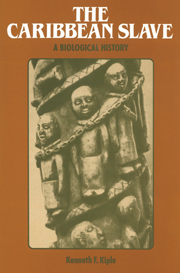Book contents
- Frontmatter
- Contents
- List of Tables
- Preface
- Acknowledgments
- Part I Background and Biology
- Introduction
- 1 The Peoples and Their Pathogens
- 2 West African Diet and Disease
- 3 The Parameters of West African Survival
- Part II Diet, Disease, and Demography
- Part III Pathogens and Politics
- Notes
- Bibliographic Essay
- Index
Introduction
Published online by Cambridge University Press: 19 October 2009
- Frontmatter
- Contents
- List of Tables
- Preface
- Acknowledgments
- Part I Background and Biology
- Introduction
- 1 The Peoples and Their Pathogens
- 2 West African Diet and Disease
- 3 The Parameters of West African Survival
- Part II Diet, Disease, and Demography
- Part III Pathogens and Politics
- Notes
- Bibliographic Essay
- Index
Summary
I have called this principle, by which each slight variation, if useful, is preserved, by the term of natural selection.
Charles Darwin (1859)The islands of the Caribbean have a disjointed history. Politically and economically their past has been written largely from the perspective of their European colonizers and, more recently owing to proximity, from the viewpoint of the United States. Socially and intellectually, their story has been European in orientation uneasily superimposed on a vibrant African culture. That Caribbean history is seen as part of a European or an African past, or even a North American past is unfortunate, but no accident, for the islands are truly artificial. Only the limestone, coral, volcanic rock, and underlying mountain ranges upon which they rest are really of this hemisphere, while most of the flora that adorn them and the fauna that inhabit them are imported. So are the men who dominate them. The original inhabitants, the Arawak and Carib Indians, passed into oblivion long ago, to be replaced manyfold by Africans, Europeans, and, in some places, Asians.
The most important reason for the disappearance of the Indians has to do with still more transients – microorganisms that traveled with the Europeans and the Africans in their hair, on their breath, in their blood, saliva, and bowels. Indeed the newcomers fairly bristled with parasites with whom they had long before worked out a kind of life-preserving compromise. As William McNeill has portrayed the process, man by his migrations, changing habits and altered lifestyle frequently created new conditions for himself, which in turn created new and virulent diseases.
- Type
- Chapter
- Information
- The Caribbean SlaveA Biological History, pp. 3 - 6Publisher: Cambridge University PressPrint publication year: 1985

